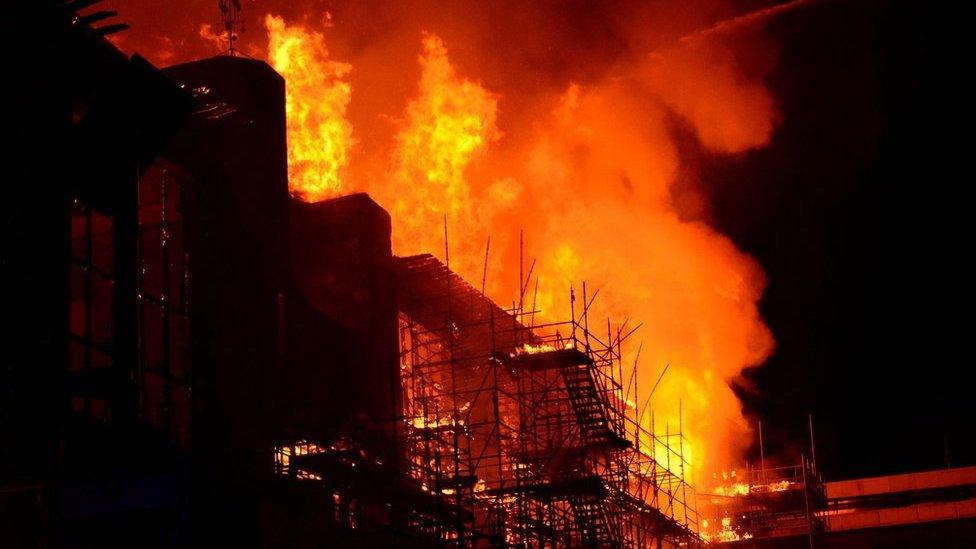Glasgow School of Art: The people still recovering from 2018 fire
- Published

Neil Douglas co-owns Antipasti with wife Julie
It has been likened to the Notre Dame in Paris in terms of global significance - but for people living and working on Glasgow's Sauchiehall Street, the Glasgow School of Art has left a "dark, looming presence" following the 2018 fire.
Investigators failed to find a cause for the blaze which reduced the school's Mackintosh building - affectionately known as the Mack - to a wreckage of rubble and iron, alongside the adjoining O2 ABC venue.
The lack of answers has frustrated residents who feel they are living on a building site, while some businesses have closed for good or moved away. Those remaining are still feeling the financial impact of Sauchiehall Street's demise.
Here we look at the lives of people affected by the fire - and whether the area could fully recover.
Fire was 'worse than the pandemic'
Neil Douglas and wife Julie own Italian restaurant Antipasti on Sauchiehall Street - one of the premises to suffer water damage from the thousands of gallons used to extinguish the flames from the art school.
Situated directly across from the Campus nightclub, the restaurant was also one of the businesses caught in the fire's exclusion zone - where business owners were unable to access their premises for weeks.
"We weren't even allowed in to get our booking diary - and we were still pen and paper back then," said co-owner Neil Douglas.
"Our dry store had flooded so we had some water damage in the basement. We were forced to close even though people were in flats on the Pitt Street side - we were so close yet so far in some ways.
"We were able to claim insurance eventually but the experience was terrifying - the insurer essentially said their job was not to pay us."
Neil's claim eventually came through 16 weeks after the fire - though he said it was "nowhere near enough" to cover losses on top of rent costs and staff wages.
Against the odds, the restaurant survived even through the Covid-19 pandemic. Other businesses closed permanently or relocated - Biggars music specialists, for example, moved to the Buchanan Galleries.
The fire-ravaged O2 ABC has remained closed and owners have submitted plans to demolish the building, including the Campus nightclub - though a decision has yet to be made on the proposal.
Meanwhile, business for Antipasti has been drastically affected by reduced footfall, and Neil believes the area has never properly recovered.
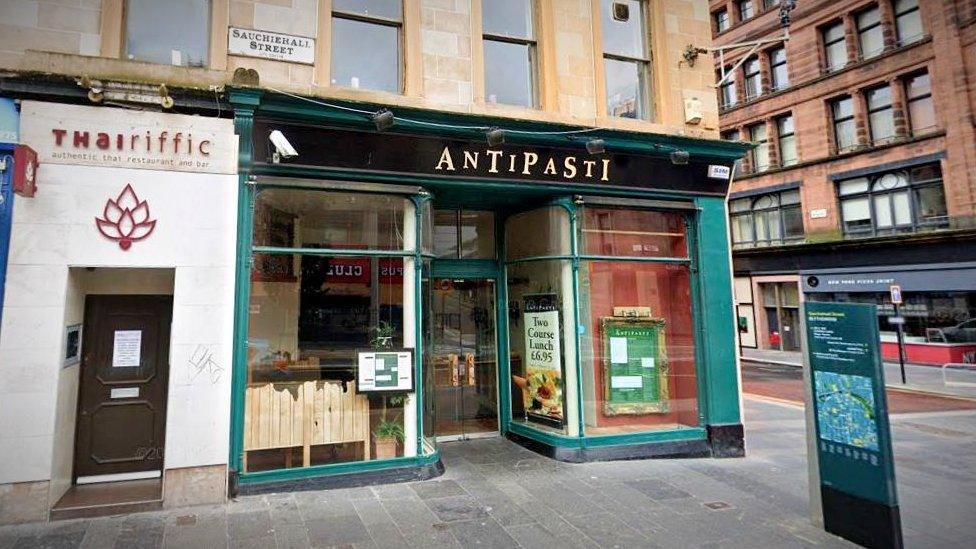
Against odds Antipasti remained open when the pandemic forced closures of restaurants across the city
He said: "The art school fire was the most challenging thing I've faced in my business career - including the pandemic - because we had already been through that unexpected closure.
"The O2 across the road was a huge part of our business and the art school would give us a steady stream. The Kings Theatre is now our one absolute driver - the market has changed for us dramatically and we've just got less strings to our bow."
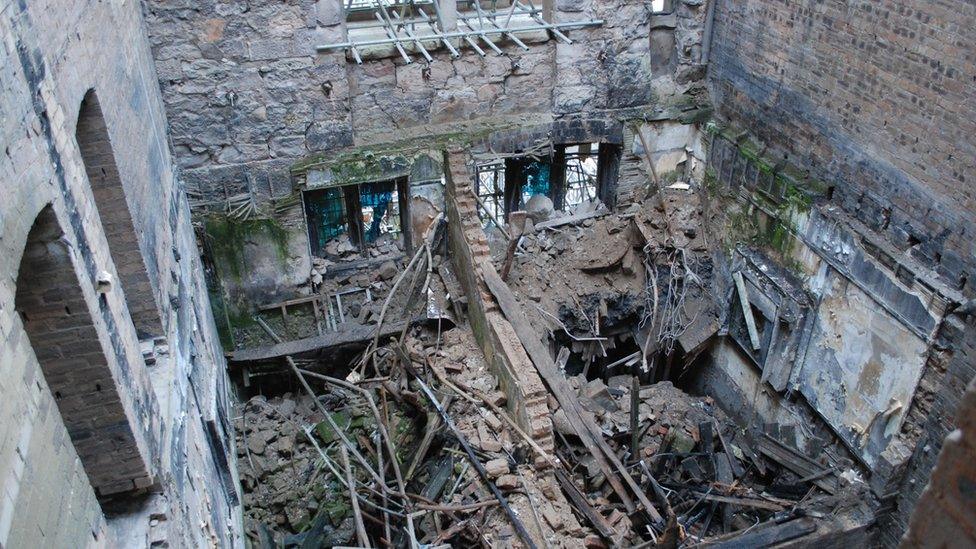
Stark images of the Glasgow School of Art interior were published as part of a fire investigation
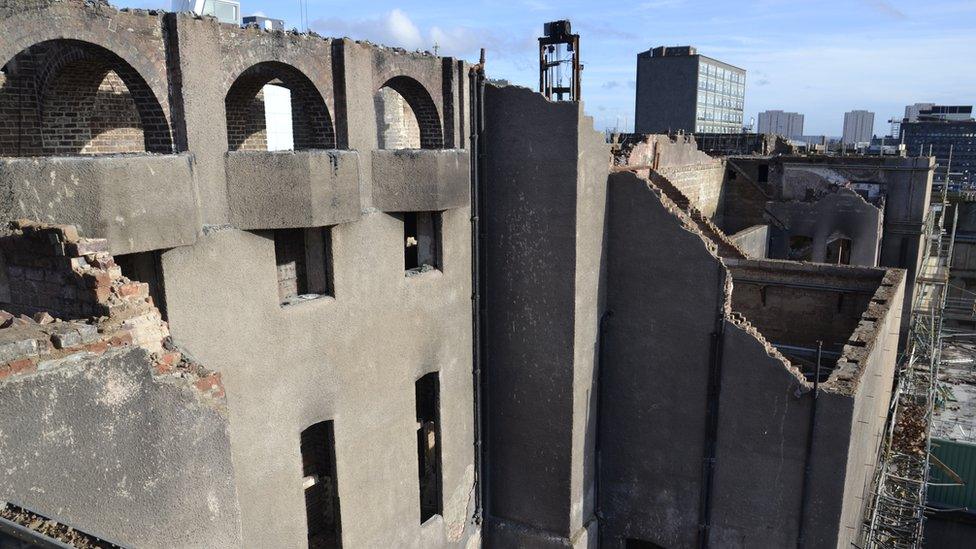
Neil said the fire-ravaged building has left a "dark and looming presence" on Sauchiehall Street
The general consensus is some kind of work should take place on the art school - but discussions on the nature of this work have produced polarised opinions.
Art school bosses are among those who want to see it "faithfully" restored and they have said they hope it can reopen between 2027 and 2032. But one architect told the BBC it would be impossible to recreate Mackintosh's work in line with modern fire safety standards.
For business owners like Neil, the key problem is far more immediate.
He said: "Sauchiehall Street has a dark and looming presence when the sun goes down, it's not a pleasant space even to walk past.
"The best thing for us is to refurbish what's there or build something new - it doesn't matter if it's a car park. Something would be better than nothing."
'We feel as if we're in limbo'
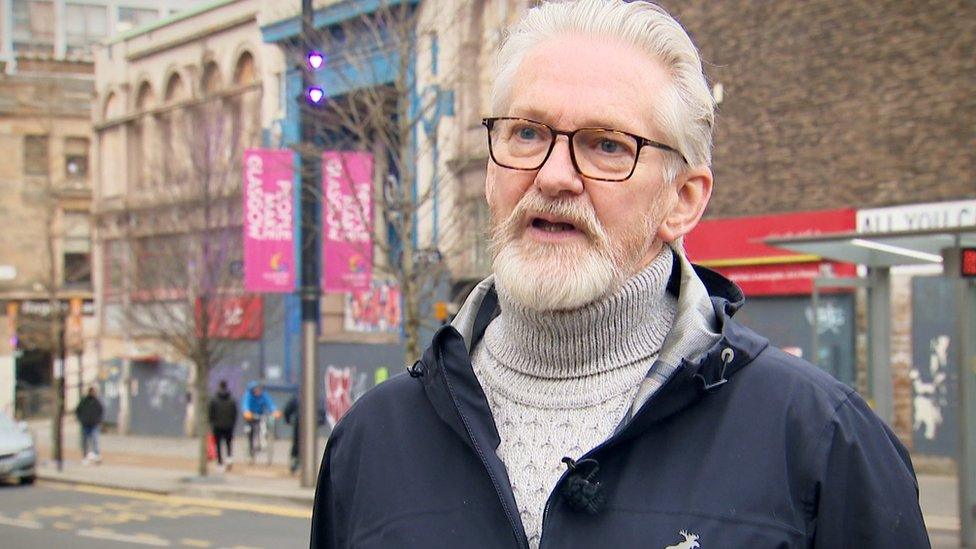
Glasgow resident Christopher Bowen lives opposite the Glasgow School of Art
Photographer Christopher Bowen was among those who watched the fire consume the Mackintosh building in 2018 - unlike onlookers on the street, he saw the blaze unfold from his living room window.
"Suddenly there was this huge column of flame and smoke and it spread incredibly quickly," he said.
"You could tell at the time this is the Mackintosh gone, it was a sickening sight to see."
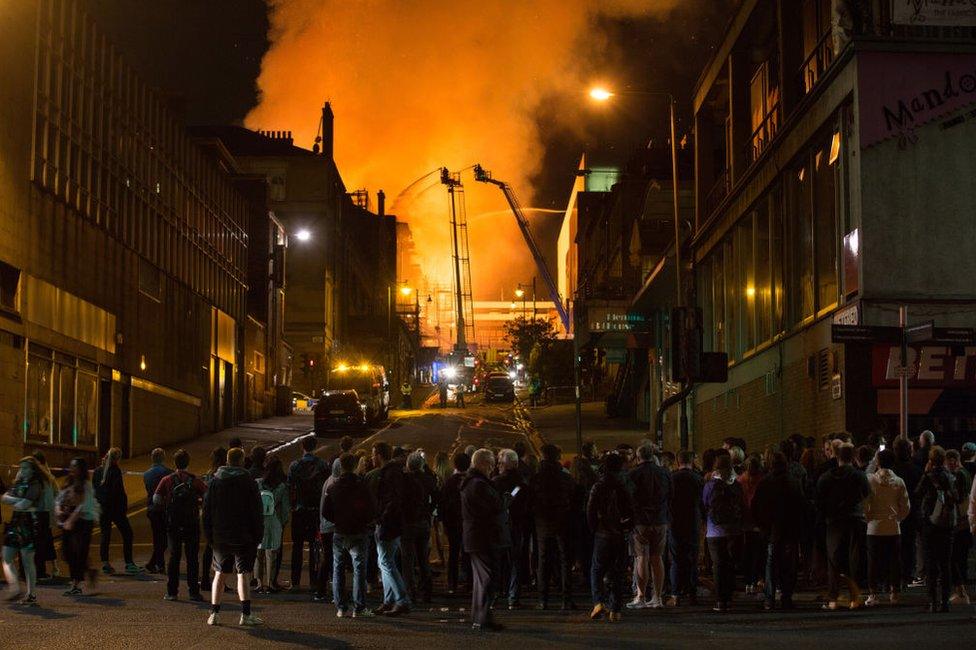
Flames ripped through the Mackintosh building after it caught fire at about 23:20
It is nearly eight years since the first fire took hold of the Glasgow School of Art, and Christopher's window still looks on to a building site.
With no clear plans in place for the Mack's reconstruction, he wonders how much longer before his neighbourhood is revitalised.
"We feel as if we're in limbo," said Christopher. "They're saying the rebuild won't start until 2026 so we might be looking at 10 years. Nobody has said what's happening to ABC2 - and it was a very vibrant part of Sauchiehall Street.
"We've seen the development of an alcohol-fuelled economy creeping up from Charing Cross, retail is being forced out and I don't think that's going to be coming back.
"Part of the attraction of the building was this enormous history within it - well that's gone, all that's left is the façade. What's going to happen to the inside? That's for other people to decide but as a resident I'm not sure that's been properly answered."
Can Sauchiehall Street be saved?
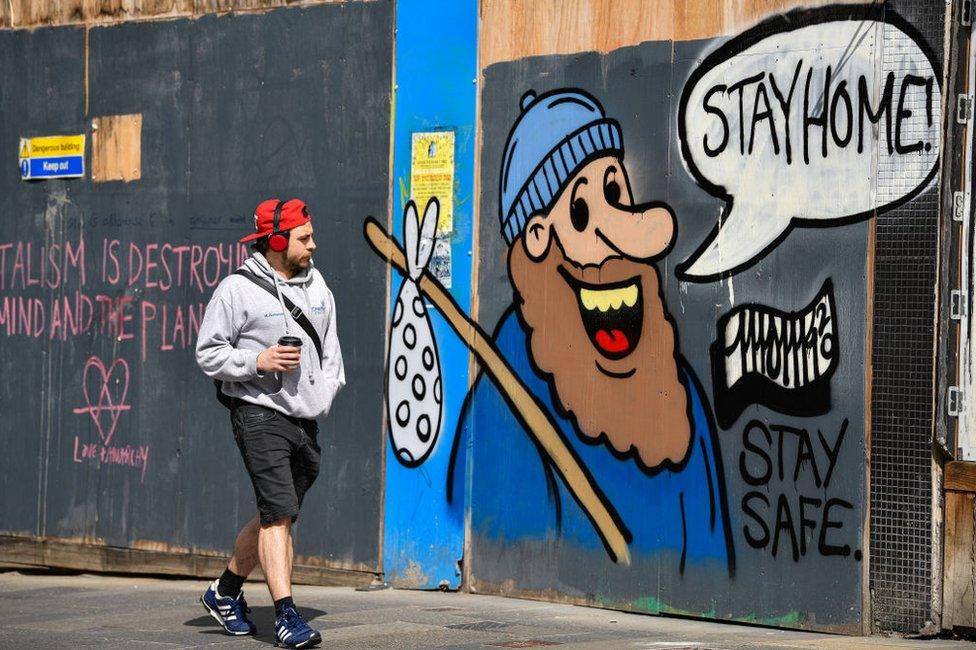
Boarded up shops on Sauchiehall Street covered by graffiti
With Marks & Spencer announcing the closure of their Sauchiehall Street branch, things are looking increasingly bleak for the once bustling high street.
Dozens of shops currently lie empty, which Glasgow City Council has previously attributed to "major changes in retailing" exacerbated by the pandemic.
In 2014, it was announced the area would benefit from a £1bn City Deal - which the council ambitiously hoped would boost the local economy by £2.4bn annually.
But according to Stuart Patrick, chief executive of Glasgow Chamber of Commerce, these improvements may not bear fruit for Sauchiehall Street until the Scottish government lift all Covid restrictions on businesses.
He said: "It's worth remembering we've had 20 months of working from home guidance or direction and we've had empty campuses and those have both very significant impacts on the city centre, particularly on Sauchiehall Street. In December we lost 40% of normal Christmas business compared to 2019.
"When [restrictions are lifted], then we're in a position to see whether the market is likely to respond to things like the public realm investment that the city council made at the Charing Cross end of Sauchiehall Street."
As for what could persuade fresh ventures to set up shop in the area, Mr Patrick believes it's a question yet unanswered.
He added: "[The end of restrictions] also allows us to begin to explore the adaptation work that we've been doing through the city centre taskforce, which means going out into the market and saying what sorts of incentives are going to be needed - and I do think incentives are going to be needed to help repurpose those empty units."
- Published25 January 2022
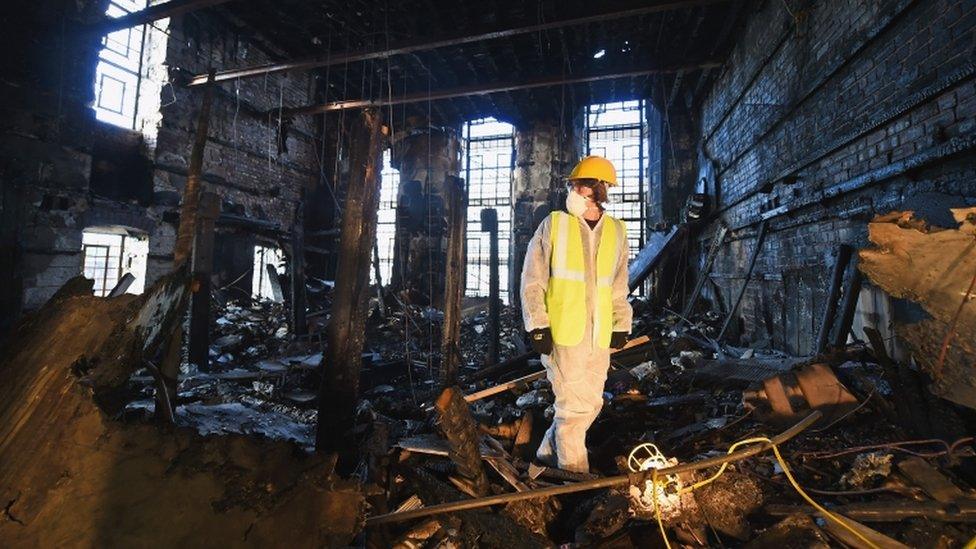
- Published25 January 2022
